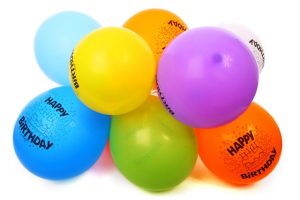When thinking of the dangers that lurk at a children’s birthday party, you would probably think of the sugary cake or the injuries from too much horseplay. What if I told you that you should add balloons to the list?
A new study by a pair of researchers at the University of Alberta found that the sound of a popping balloon can be louder than a gunshot.
How Loud is A Balloon Pop?
The co-authors of this study, Bill Hodgetts and Dylan Scott, have been to their fair number of children’s parties. That is where they came up with the idea of actually testing how loud the pop of a balloon is.
Their study used a standard package of party balloons that any parent would purchase for the big day. They did a series of experiments and measured the results. Blown up balloons that were popped by a pin measured 155 dB and those popped by hand measured 159 dB. The loudest pop came from a balloon that was inflated until it popped. At close range, the sound of this balloon rupturing measured 168 dB, louder than the blast of a pistol (167 dB) or a 12-gauge shotgun (162 dB).
Noise-Induced Hearing Loss
You may find yourself wondering what these results mean. Hearing loss caused by exposure to loud noises is called noise-induced hearing loss. Noise-induced hearing loss is caused by exposure to an extremely loud sound or prolonged exposure to loud sounds over time. Specifically,
- Exposure to sound over 85 dB can cause damage within 8 hours
- Exposure to sound over 100 dB can cause damage within 15 minutes
- Exposure to sound over 120 dB can cause damage instantly
This type of hearing loss is the second most common (behind only presbycusis, hearing loss related to normal aging); it is also the most preventable type.
Hearing specialists estimate that 15 percent of individuals in Green Valley and around the country between the ages of 20 and 69 are experiencing hearing loss that is the result of exposure to excessive noise either at work or through recreational activities. Activities most likely to contribute to hearing loss include hunting, riding motorcycles and snowmobiles, attending rock concerts, listening to music at high volume through earbuds or headphones, mowing the lawn or using a leaf blower and now, added to the list, attending birthday parties.
What Do the Results Mean?
While the study results probably won’t eliminate the use of balloons, they can help spread awareness. If anything, please take these findings to heart and teach your children how to handle balloons safely. This can prevent accidental popping, which puts them at risk of damaging their hearing.
To learn more about protecting yourself or your children from noise-induced hearing loss, contact your Green Valley audiologist.
